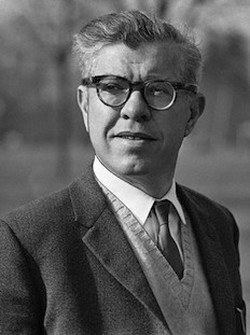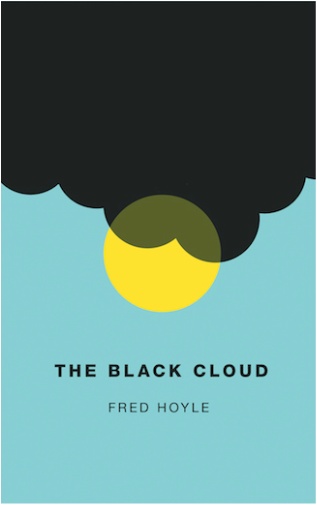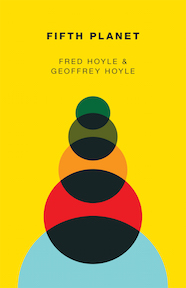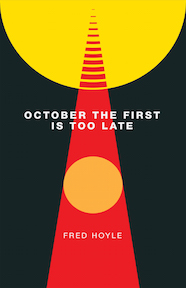|
BOOK DETAILS
Trade paper ISBN-13: 978-1941147429 List Price: $17.99 U.S. Pages: 238 Published: 2015 |
The Black Cloud (1957)
Fred Hoyle With a new foreword by Geoffrey Hoyle Due to copyright restrictions, this title is not available in the UK, Canada, or current/former British Commonwealth countries.
Orders from addresses in these areas will be cancelled and refunded. Credit card processing fees of 5% are non-refundable on all cancellations. Any questions, please ask *before* ordering. Book Description
Astronomers in England and America have made a terrifying discovery: an ominous black cloud the size of Jupiter is travelling straight towards our solar system. If their calculations are correct, the cloud’s path will bring it between the Earth and the Sun, blocking out the Sun’s rays and threatening unimaginable consequences for our planet. With the fate of every living thing on Earth in the balance, world leaders assemble a team of brilliant scientists to figure out a way to stop the cloud. But when they uncover the truth behind its origins, they will be forced to reconsider everything they think they know about the nature of life in the universe . . . A landmark of British science fiction, The Black Cloud (1957) was the first novel by world-renowned astronomer Sir Fred Hoyle (1915-2001), who used his own scientific background to create a frighteningly real apocalyptic thriller in which, Hoyle said, “there is very little that could not conceivably happen.” Long recognized as a classic in Great Britain, Hoyle’s novel returns to print in the U.S. for the first time in over 40 years in this edition, published to coincide with the centennial of the author’s birth and featuring a new foreword by Geoffrey Hoyle. |
reviews
“One of the greatest works of science fiction ever written.” – Richard Dawkins
“Without a question the most intelligently written science fiction story I have ever read . . . A terrific yarn.” – Charlotte Observer
“An eerie story which demands the reader’s attention from start to finish.” – Denver Post
“[A] rattling good story . . . a really thrilling book. There is a largeness, generosity, and jollity about the whole spirit of the book that reminds one of the early Wells at his best.” – G. S. Fraser, New Statesman
“A prominent astronomer’s first fictional excursion is also a scientific diversion of some brilliance . . . considerable humor, and manages an intellectual entertainment for hi-fi tastes.” – Kirkus
“[F]ascinatingly authentic . . . Hoyle builds up his story to a remarkable pitch of tension and then produces his astonishing climax . . . an exciting story well laced with satirical humour.” – Liverpool Daily Post
“Without a question the most intelligently written science fiction story I have ever read . . . A terrific yarn.” – Charlotte Observer
“An eerie story which demands the reader’s attention from start to finish.” – Denver Post
“[A] rattling good story . . . a really thrilling book. There is a largeness, generosity, and jollity about the whole spirit of the book that reminds one of the early Wells at his best.” – G. S. Fraser, New Statesman
“A prominent astronomer’s first fictional excursion is also a scientific diversion of some brilliance . . . considerable humor, and manages an intellectual entertainment for hi-fi tastes.” – Kirkus
“[F]ascinatingly authentic . . . Hoyle builds up his story to a remarkable pitch of tension and then produces his astonishing climax . . . an exciting story well laced with satirical humour.” – Liverpool Daily Post
ALSO AVAILABLE THROUGH ONLINE RETAILERS
|
PAPERBACK
Amazon US Barnes and Noble Wordery* *free shipping to 40 countries Fishpond* *free shipping worldwide |
MORE TITLES BY THIS AUTHOR
AUTHOR BIOGRAPHY

Fred Hoyle was born at Bingley, Yorkshire in 1915 and educated at Bingley Grammar School and Emmanuel College, Cambridge. A Fellow of St. John’s College, Cambridge, he was a lecturer in mathematics from 1945 to 1958, when he was appointed to the prestigious post of Plumian Professor of Astronomy and Experimental Philosophy. He became the founding director of the Institute of Theoretical Astronomy at Cambridge in 1967 and was knighted in 1972. He also held a position as a visiting professor of astrophysics at the California Institute of Technology.
Internationally famous as a scientist, Hoyle is remembered today as the foremost proponent of the steady-state theory of the universe and for his pioneering work in the field of stellar nucleosynthesis. An extremely original thinker, Hoyle was not afraid to advance controversial ideas, many of which were later proved correct. In the 1950s, when his paper on interstellar molecules was rejected for publication, he rewrote his ideas as a novel, The Black Cloud (1957). This book was a popular success and has remained in print continuously in Great Britain; its success paved the way for a number of other science fiction works, often co-authored by Hoyle with his son Geoffrey.
Several of Hoyle’s works, including Ossian’s Ride (1960), A for Andromeda (1962), Fifth Planet (1963), and October the First is Too Late (1966), have gone on to be recognized as classics of the genre. Hoyle was also well known for his nonfiction writings, which aimed at making science accessible to popular audiences and young readers, and for his BBC radio broadcasts and television work. He died in 2001.
Internationally famous as a scientist, Hoyle is remembered today as the foremost proponent of the steady-state theory of the universe and for his pioneering work in the field of stellar nucleosynthesis. An extremely original thinker, Hoyle was not afraid to advance controversial ideas, many of which were later proved correct. In the 1950s, when his paper on interstellar molecules was rejected for publication, he rewrote his ideas as a novel, The Black Cloud (1957). This book was a popular success and has remained in print continuously in Great Britain; its success paved the way for a number of other science fiction works, often co-authored by Hoyle with his son Geoffrey.
Several of Hoyle’s works, including Ossian’s Ride (1960), A for Andromeda (1962), Fifth Planet (1963), and October the First is Too Late (1966), have gone on to be recognized as classics of the genre. Hoyle was also well known for his nonfiction writings, which aimed at making science accessible to popular audiences and young readers, and for his BBC radio broadcasts and television work. He died in 2001.




